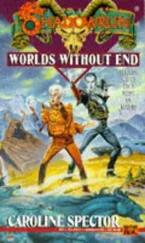“I don’t need to ask you what it’s about.”
“Say I want to meet him in private.”
Alan raised an eyebrow. “No offence, but you were a girl last time. You’re twenty years older today.”
“Do you think perhaps we should let him decide?”
“Of course.” He grinned insultingly. “I know he remembers that afternoon at the Bell.”
Alan had been there, of course. He had watched Gwenda take off her dress, and stared at her naked body. He had seen her walk to the bed and kneel on the mattress, facing away. He had laughed coarsely when Ralph said she was better looking from behind.
She hid her revulsion and shame. “I was hoping he would remember,” she said as neutrally as she could.
The other petitioners realized Alan must be someone important. They began to crowd around, speaking to him, begging and pleading. He pushed them aside and went into the hall.
Gwenda settled down to wait.
After an hour it was clear Ralph was not going to see her before dinner. She found a patch of ground that was not too muddy and sat with her back to a stone wall, but she never took her eyes off the entrance to the hall.
A second hour passed, and a third. Noblemen’s dinners often went on all afternoon. Gwenda wondered how they could keep on eating and drinking for such a long time. Why did they not burst?
She had eaten nothing all day, but she was too tense to feel hungry.
It was grey April weather, and the sky began to darken early. Gwenda shivered on the cold ground, but she stayed where she was. This was her only chance.
Servants came out and lit torches around the courtyard. Lights appeared behind the shutters in some of the windows. Night fell, and Gwenda realized there were about twelve hours left until dawn. She thought of Sam, sitting on the floor in one of the underground chambers beneath the castle, and wondered if he was cold. She fought back tears.
It’s not over yet, she told herself; but her courage was weakening.
A tall figure blocked the light from the nearest torch. She looked up to see Alan. Her heart leaped.
“Come with me,” he said.
She jumped to her feet and moved towards the hall door.
“Not that way.”
She looked inquiringly at him.
“You said privately, didn’t you?” Alan said. “He’s not going to see you in the chamber he shares with the countess. Come this way.”
She followed him through a small door near the stables. He led her through several rooms and up a staircase. He opened a door to a narrow bedchamber. She stepped inside. Alan did not follow her in, but closed the door from the outside.
It was a low room almost completely filled by a bedstead. Ralph stood by the window in his undershirt. His boots and outer clothing were piled on the floor. His face was flushed with drink, but his speech was clear and steady. “Take off your dress,” he said with a smile of anticipation.
Gwenda said: “No.”
He looked startled.
“I’m not taking my clothes off,” she said.
“Why did you tell Alan you wanted to see me in private?”
“So that you would think I was willing to have sex with you.”
“But if not… why are you here?”
“To beg you to ask the king for a pardon.”
“But you’re not offering yourself to me?”
“Why would I? I did that once before, and you broke your word. You reneged on the deal. I gave you my body, but you didn’t give my husband his land.” She allowed the contempt she felt to be heard in her tone of voice. “You would do the same again. Your honour is nothing. You remind me of my father.”
Ralph coloured. It was an insult to tell an earl that he could not be trusted, and even more offensive to compare him with a landless labourer who trapped squirrels in the woods. Angrily he said: “Do you imagine this is the way to persuade me?”
“No. But you’re going get that pardon.”
“Why?”
“Because Sam is your son.”
Ralph stared at her for a moment. “Hah,” he said contemptuously. “As if I would believe that.”
“He is your son,” she repeated.
“You can’t prove that.”
“No, I can’t,” she said. “But you know that I lay with you at the Bell in Kingsbridge nine months before Sam was born. True, I lay with Wulfric, too. So which of you is his father? Look at the boy! He has some of Wulfric’s mannerisms, yes – he has learned those, in twenty-two years. But look at his features.”
She saw a thoughtful expression appear on Ralph’s face, and knew that something she had said had hit the mark.
“Most of all, think about his character,” she said, pressing home. “You heard the evidence at the trial. Sam didn’t just fight Jonno off, as Wulfric would have done. He didn’t knock him down then help him up again, which would have been Wulfric’s way. Wulfric is strong, and quick to anger, but he’s tender-hearted. Sam is not. Sam hit Jonno with a spade, a blow that would have knocked any man senseless; then, before Jonno fell, Sam hit him again, even harder, although he was already helpless; and then, before Jonno’s limp form reached the ground, Sam hit him a third time. If the Oldchurch peasants hadn’t jumped on Sam and restrained him, he would have continued to lash out with that bloody spade until Jonno’s head was smashed to a pulp. He wanted to kill!” She realized she was crying, and wiped the tears away with her sleeve.
Ralph was staring at her with a horrified look.
“Where does the killer instinct come from, Ralph?” she said. “Look in your own black heart. Sam is your son. And, God forgive me, he’s mine.”
*
When Gwenda had gone, Ralph sat on the bed in the little chamber, staring at the flame of the candle. Was it possible? Gwenda would lie, if it suited her, of course; there was no question of trusting her. But Sam could be Ralph’s son as easily as Wulfric’s. They had both lain with Gwenda at the crucial time. The truth might never be known for sure.
Even the possibility that Sam might be his child was enough to fill Ralph’s heart with dread. Was he about to hang his own son? The dreadful punishment he had devised for Wulfric might be inflicted on himself.
It was already night. The hanging would take place at dawn. Ralph did not have long to decide.
He picked up the candle and left the little room. He had intended to satisfy a carnal desire there. Instead he had been given the shock of his life.
He went outside and crossed the courtyard to the cell block. On the ground floor of the building were offices for the sheriff’s deputies. He went inside and spoke to the man on guard duty. “I want to see the murderer, Sam Wigleigh.”
“Very good, my lord,” the jailer said. “I’ll show you the way.” He led Ralph into the next room, carrying a lamp.
There was a grating set in the floor, and a bad smell. Ralph looked down through the grating. The cell was nine or ten feet deep with stone walls and a dirt floor. There was no furniture: Sam sat on the floor with his back against the wall. Beside him was a wooden jug, presumably containing water. A small hole in the floor appeared to be the toilet. Sam glanced up, then looked away indifferently.
“Open up,” said Ralph.
The jailer unlocked the grating with a key. It swung up on a hinge.
“I want to go down.”
The jailer was surprised, but did not dare argue with an earl. He picked up a ladder that was leaning against the wall and slid it into the cell. “Take care, please, my lord,” he said nervously. “Remember, the villain has nothing to lose.”
Ralph climbed down, carrying his candle. The smell was disgusting, but he hardly cared. He reached the foot of the ladder and turned.
Sam looked up at him resentfully and said: “What do you want?”
Читать дальше












